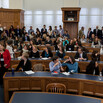ISP to Hold Unlocking the Black Box Conference
The Information Society Project at Yale Law School will hold a Conference titled “Unlocking the Black Box: The Promise and Limits of Algorithmic Accountability in the Profession,” on April 2, 2016. The conference will examine the concerns that have been raised over the increasing power of big data and algorithmic decision making—in commercial, government, and non-profit contexts.
Three characteristics of algorithmic ordering have made the problem particularly difficult to address: the data used may be inaccurate or inappropriate, algorithmic modeling may be biased or limited, and the uses of algorithms are still opaque in many critical sectors, conference organizers said.
Since no single academic field can address all of the new problems created by algorithmic decision making, organizers said that collaboration among experts in different fields is critical and is already starting to yield important responses.
Algorithmic accountability calls for the development of a legal-academic community, developed inter-disciplinarily among theorists and empiricists, practitioners and scholars, journalists and activists. This conference will explore early achievements among those working for algorithmic accountability, and will help chart the future development of an academic community devoted to accountability as a principle of research, investigation, and action.
“The conference will bring together more than 40 panelists and commentators to discuss the increasing power of big data and algorithmic decision making in the professions," said Valerie Belair-Gagnon, Executive Director of the Information Society Project. “The Unlocking the Black Box conference provides an opportunity for scholars from multiple disciplines engaged in path-breaking research into working for algorithmic accountability to publicize their work and receive feedback.”
Researchers are going beyond the analysis of extant data, and joining coalitions of watchdogs, archivists, open data activists, and public interest attorneys, to assure a more balanced set of “raw materials” for analysis, synthesis, and critique. The conference will seek to answer what similar directions for legal scholars and journalists would look like by setting forth algorithmic accountability as a paradigm of what Professor Kenneth Gergen has called “future-forming” research.
"Some economists consider the professions to be an outdated concept in an era of computerization and automation,” said Frank Pasquale, an affiliated fellow at Yale ISP and Professor at the University of Maryland Carey Law School. “Our conference will critically interrogate that notion, as several speakers will show that professional judgments about the scope, purpose, and nature of algorithmic decision making are more vital than ever. Lawyers, journalists, social scientists, and many other professionals must have an opportunity to monitor and challenge predictive analytics, as well as decision-making drive by big data and artificial intelligence.”
The conference is co-sponsored by the Oscar M. Ruebhausen (OMR) Fund, the Yale Journal for Law and Technology (YJoLT), the Yale Law & Tech Society and the Yale Global Health Justice Partnership.
The Information Society Project (ISP) at Yale Law School is an intellectual center that explores the implications of the Internet and new information technologies for law and society. The ISP is guided by the values of democracy, development, and civil liberties. Our work includes copyright, media law and policy, transparency, and privacy. For more information, visit the Yale ISP website.


